How we went to Scala Days 2014
As you probably already know, our company actively uses Scala and tries to support the developer community. So, not so long ago, we initiated the creation of a Moscow user group . Last time, our colleague went to the conference on his own initiative, as was written off in one of the previous articles . This time, already along the beaten path, it was decided to assign two particularly distinguished employees. So, in general, we went to Scala Days.
Next, I will try to describe my impressions of the event and briefly tell you about the most memorable presentations. All reports are available here .
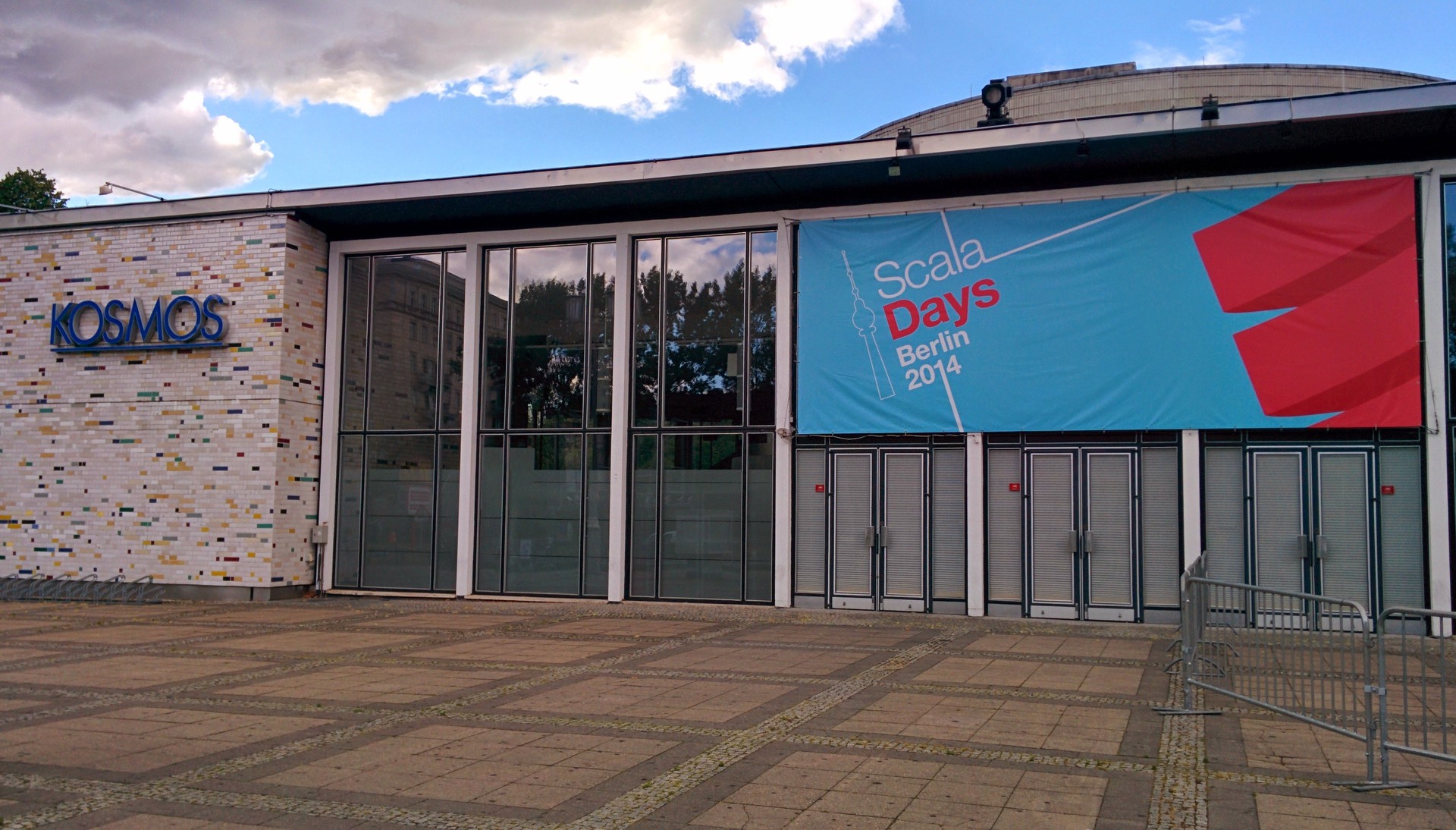
This year the conference was held in Berlin. The city as a whole liked. Lots of parks and cyclists, few cars. The North somehow reminded me of Moscow. Sights are not so many, for a couple of days you can get around all the tourist mecca. The Kosmos cinema was chosen as the location for the conference.
')
The first day was not very busy. According to the plan there was only keynout by Martin Odersky and afterparty. Before registration was the meeting of the founders of the rock user groups. Being the only person from Moscow, I ended up representing the Moscow user group. There was not much time, but we managed to meet and discuss pressing issues. The problems turned out to be surprisingly more or less the same for everyone: how to attract people to the group, how to balance the reports, to make it interesting for all categories, from newcomers to professionals in their field, how to maintain interest in the group, and stuff like that.
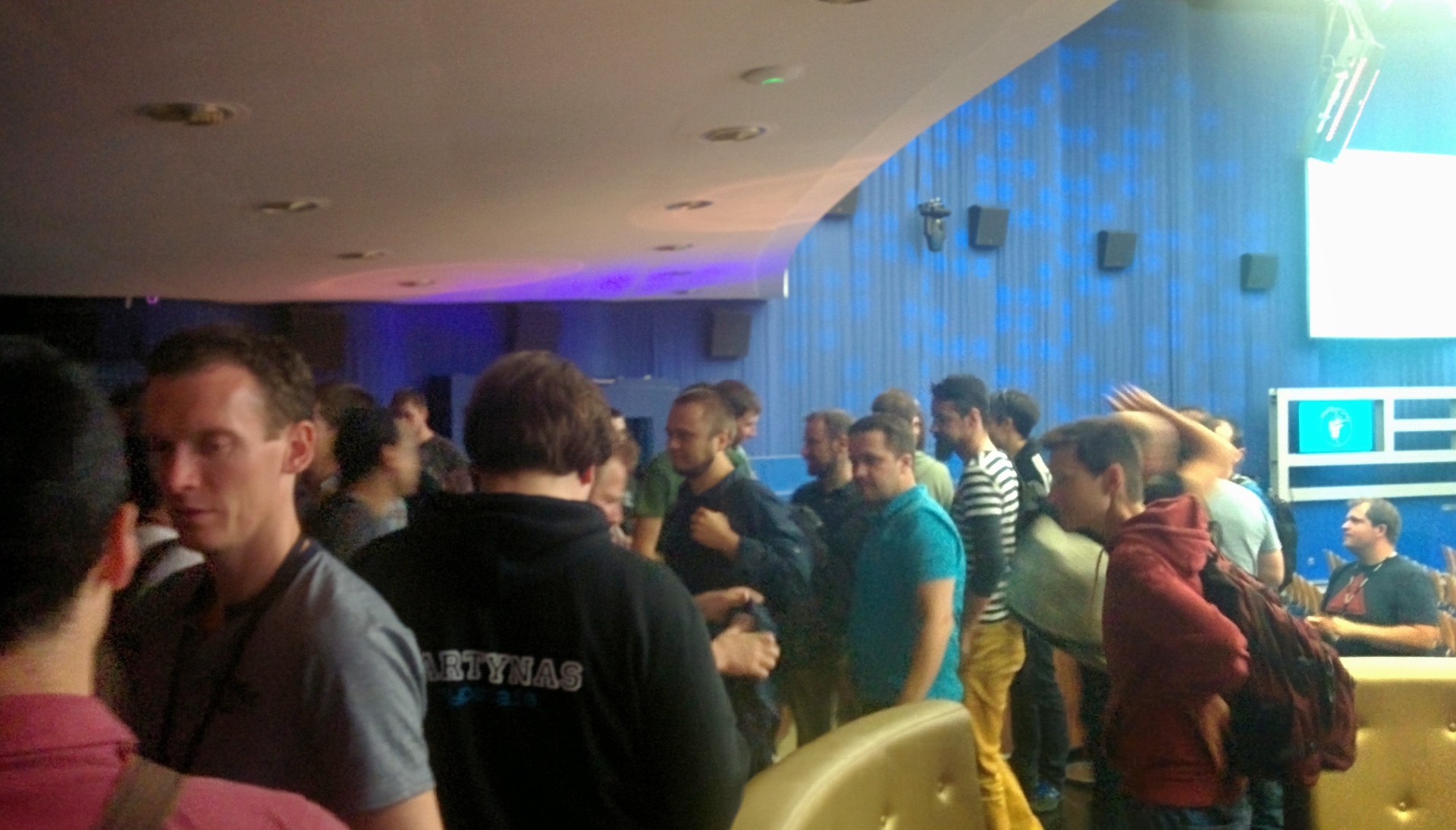
Next was the presentation of Martin Odersky “Scala. The Simple Parts ” , in which he told how he sees programming on a rock and which (best) parts of the language he uses in his daily work. We remembered a little the history of the language he thought about and what happened in the end.
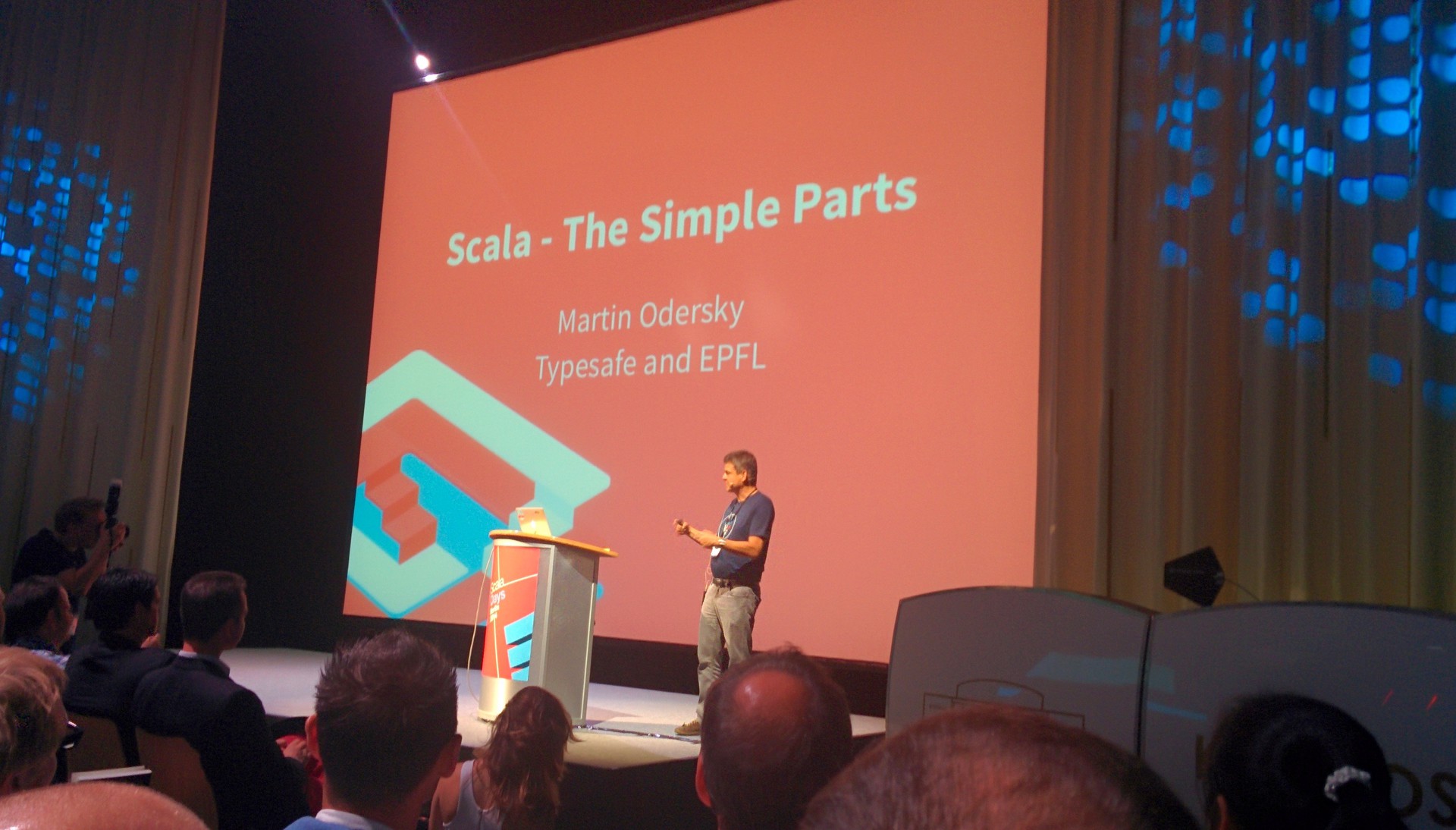
After there was a reception on which everyone could meet and talk. There were a lot of Germans among the visitors, a small Hindu community emerged (suggested that Scala did make its way into the harsh enterprise), and sometimes it was possible to hear Russian as well.
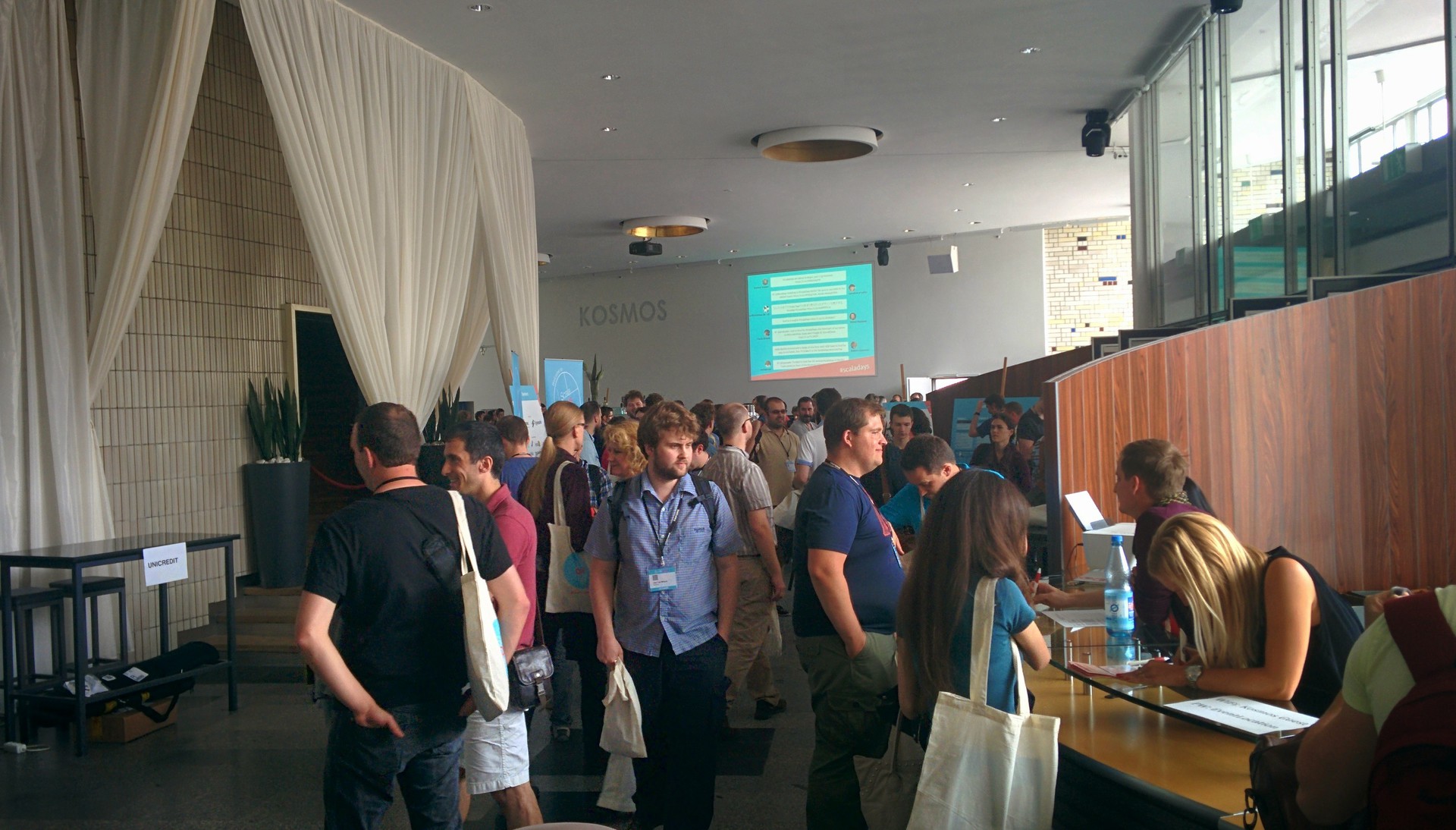
The following days were already full and full of reports. The second day began with Eric Meijer's keynote “Contravariance is the Dual of Covariance” about denotational semantics. Eric , as usual, was in his psychedelic shirt, which he usually hypnotizes the audience. He joked a lot, and sometimes it was difficult to understand when he was trolling the audience, and when he was serious. As a result, despite the academic bias, the report was taken rather easily.

Further, in the course of the conference, four reports were read in parallel, and it was necessary to make a choice who, in fact, I would like to hear the most. An application from a team called 47 Degrees (remind someone, right?) Written specifically for the conference helped a lot in choosing. In addition to viewing the schedule and adding interesting reports to the calendar, it can be used to post to Twitter, view information about speakers and (killer feature) save information about other conference participants (for this, everyone has a QR code on the badge). In general, everything is in order not to be distracted by technical details and to make the pastime at the conference enjoyable.
There were many presentations, then I will try to briefly tell you about the most memorable ones.
Viktor Klang and Roland Kuhn tried to convey to the audience what reactivity is and how to achieve it with reactive streams. There was also a demo with live coding, where Kuhn demonstrated the capabilities of akka-streams. In general, if you pay attention to the names of the presentations, the word “reactive” occurs almost in every third report, and it became, in my opinion, the buzzword of the conference. In general, the trend is there.
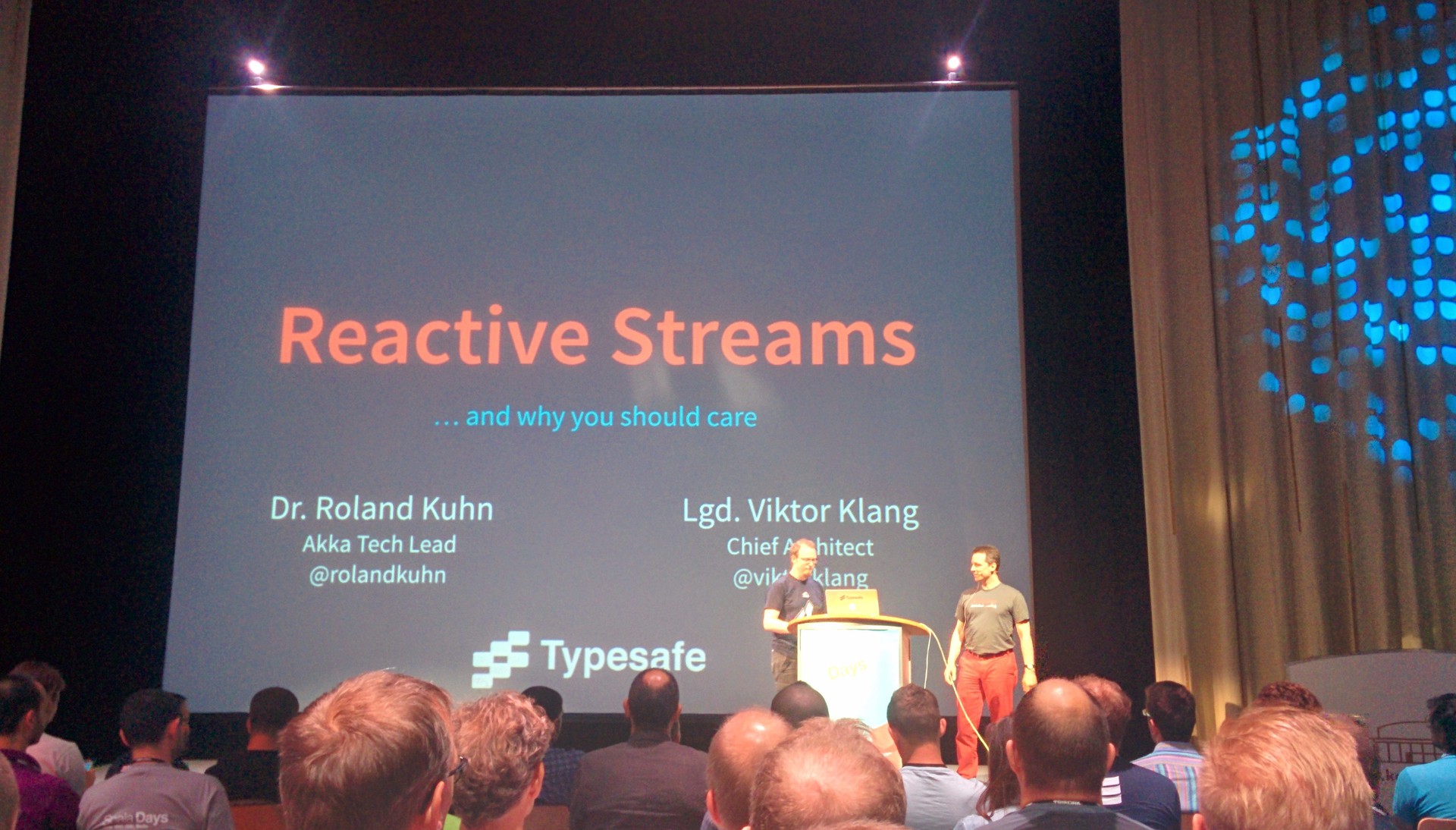
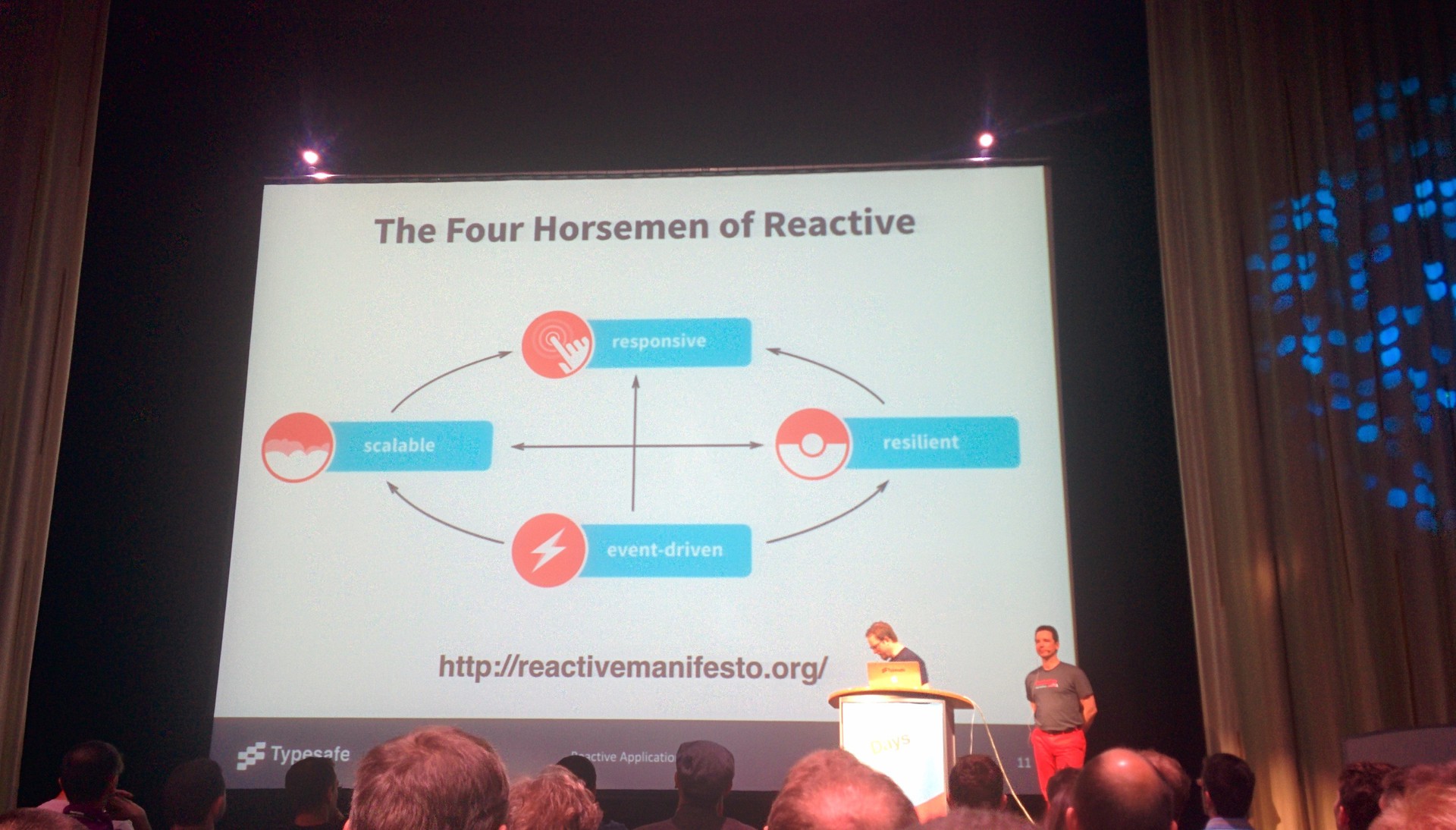

Dynamic Push-Pull - the whole essence of reactive streams; nothing cosmic, very much like tcp.
Mathias Doenitz talked about the future of the spray library. The main message was that the spray will be part of akka 2.4 and will be based on reactive streams. The promised preview of akka-http is available now, and everyone can put their hands to it, which is good news.


It was originally planned that the http module will be ready for the conference.
Chad Fowler talked about his work, about how he kills the legacy system. In the report, he tried to define such systems and figure out why, ultimately, software becomes legacy, and how this can be avoided. In general, a very good presentation, makes you think about what we are doing.
Jon Pretty and Miles Sabin staged a whole show in two faces. It turned out very cool. There was a sea of jokes, Shapeless port and live coding on Scala version 1.3. They remembered all the honored leaders of the community.
Lovers ofhardcore scalaz Rúnar Bjarnason talked about how to compose programs with the help of Free Monad. The bottom line is that the logic of the program is defined by the composition of such monads (although, in general, the monads are stacked pretty badly), which gives an abstraction over the execution thread. A sophisticated audience will find food for thought.

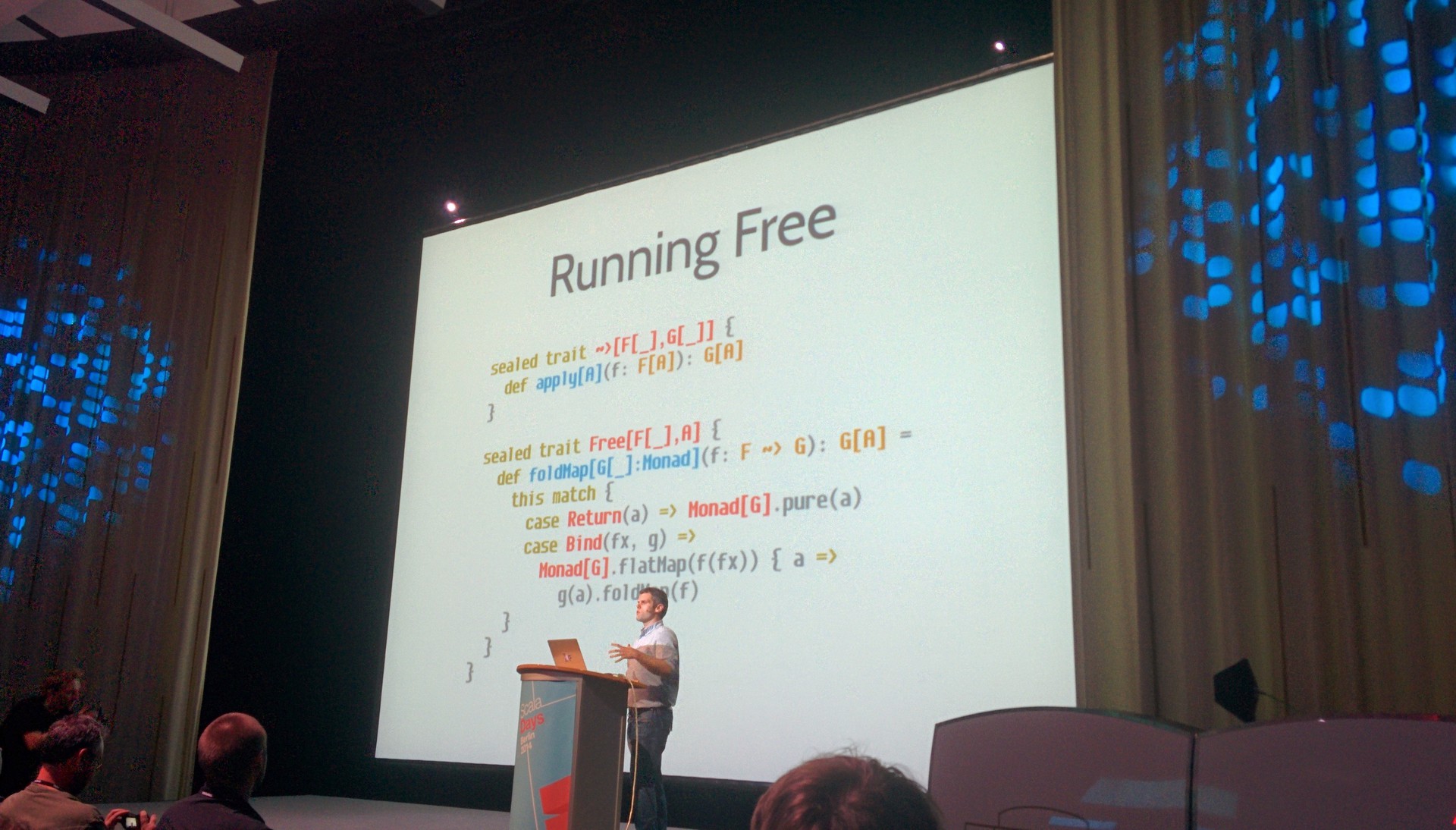
Denis Shabalin makes quasiquotes for Scala. In the report, he talked about their capabilities and showed how using quasi-quotes you can make an interpreter for the Joy language. Quite an interesting presentation with a practical bias.


As a result, the conference left a pleasant impression. The organization was on the level, the comfortable cinema halls did not let us get tired after a series of reports, plus, the event was held in a friendly atmosphere that (together with German beer) only promoted communication. All the reports were fair, the speakers were prepared, and everyone could find a talk for themselves. In general, I tried to convey that it is not bad sometimes to choose time just to unwind, see new places, chat with interesting people and learn something new for yourself.
Next, I will try to describe my impressions of the event and briefly tell you about the most memorable presentations. All reports are available here .

Berlin
This year the conference was held in Berlin. The city as a whole liked. Lots of parks and cyclists, few cars. The North somehow reminded me of Moscow. Sights are not so many, for a couple of days you can get around all the tourist mecca. The Kosmos cinema was chosen as the location for the conference.
')
Keynout
The first day was not very busy. According to the plan there was only keynout by Martin Odersky and afterparty. Before registration was the meeting of the founders of the rock user groups. Being the only person from Moscow, I ended up representing the Moscow user group. There was not much time, but we managed to meet and discuss pressing issues. The problems turned out to be surprisingly more or less the same for everyone: how to attract people to the group, how to balance the reports, to make it interesting for all categories, from newcomers to professionals in their field, how to maintain interest in the group, and stuff like that.

Next was the presentation of Martin Odersky “Scala. The Simple Parts ” , in which he told how he sees programming on a rock and which (best) parts of the language he uses in his daily work. We remembered a little the history of the language he thought about and what happened in the end.

After there was a reception on which everyone could meet and talk. There were a lot of Germans among the visitors, a small Hindu community emerged (suggested that Scala did make its way into the harsh enterprise), and sometimes it was possible to hear Russian as well.

The conference
The following days were already full and full of reports. The second day began with Eric Meijer's keynote “Contravariance is the Dual of Covariance” about denotational semantics. Eric , as usual, was in his psychedelic shirt, which he usually hypnotizes the audience. He joked a lot, and sometimes it was difficult to understand when he was trolling the audience, and when he was serious. As a result, despite the academic bias, the report was taken rather easily.

Further, in the course of the conference, four reports were read in parallel, and it was necessary to make a choice who, in fact, I would like to hear the most. An application from a team called 47 Degrees (remind someone, right?) Written specifically for the conference helped a lot in choosing. In addition to viewing the schedule and adding interesting reports to the calendar, it can be used to post to Twitter, view information about speakers and (killer feature) save information about other conference participants (for this, everyone has a QR code on the badge). In general, everything is in order not to be distracted by technical details and to make the pastime at the conference enjoyable.
There were many presentations, then I will try to briefly tell you about the most memorable ones.
Reactive Streams: And why you should care
Viktor Klang and Roland Kuhn tried to convey to the audience what reactivity is and how to achieve it with reactive streams. There was also a demo with live coding, where Kuhn demonstrated the capabilities of akka-streams. In general, if you pay attention to the names of the presentations, the word “reactive” occurs almost in every third report, and it became, in my opinion, the buzzword of the conference. In general, the trend is there.



Dynamic Push-Pull - the whole essence of reactive streams; nothing cosmic, very much like tcp.
akka-http: (un) REST for your Actors
Mathias Doenitz talked about the future of the spray library. The main message was that the spray will be part of akka 2.4 and will be based on reactive streams. The promised preview of akka-http is available now, and everyone can put their hands to it, which is good news.


It was originally planned that the http module will be ready for the conference.
Legacy
Chad Fowler talked about his work, about how he kills the legacy system. In the report, he tried to define such systems and figure out why, ultimately, software becomes legacy, and how this can be avoided. In general, a very good presentation, makes you think about what we are doing.
Scala: The First Ten Years
Jon Pretty and Miles Sabin staged a whole show in two faces. It turned out very cool. There was a sea of jokes, Shapeless port and live coding on Scala version 1.3. They remembered all the honored leaders of the community.
Composable application architecture with reasonably priced monads
Lovers of


Quote or be quoted
Denis Shabalin makes quasiquotes for Scala. In the report, he talked about their capabilities and showed how using quasi-quotes you can make an interpreter for the Joy language. Quite an interesting presentation with a practical bias.


Finally
As a result, the conference left a pleasant impression. The organization was on the level, the comfortable cinema halls did not let us get tired after a series of reports, plus, the event was held in a friendly atmosphere that (together with German beer) only promoted communication. All the reports were fair, the speakers were prepared, and everyone could find a talk for themselves. In general, I tried to convey that it is not bad sometimes to choose time just to unwind, see new places, chat with interesting people and learn something new for yourself.
Source: https://habr.com/ru/post/228807/
All Articles